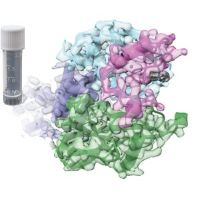Specification
| Description | Recombinant protein from the full-length sequence of Homo sapiens caspase 8 (CASP8), transcript variant G (NM_001080125). |
| Organism | Homo sapiens (Human) |
| Expression Host | Human Cells |
| Tag Info | His or DYKDDDDK. Please contact us if you need further information or require specific designed tag. |
| Purity | Greater than 90% by SDS-PAGE gel |
| Uniprot ID | Q14790 |
| Entry Name | CASP8_HUMAN |
| Gene Names | CASP8 MCH5 |
| Alternative Gene Names | MCH5 |
| Alternative Protein Names | Caspase-8 (CASP-8) (EC 3.4.22.61) (Apoptotic cysteine protease) (Apoptotic protease Mch-5) (CAP4) (FADD-homologous ICE/ced-3-like protease) (FADD-like ICE) (FLICE) (ICE-like apoptotic protease 5) (MORT1-associated ced-3 homolog) (MACH) [Cleaved into: Caspase-8 subunit p18; Caspase-8 subunit p10] |
| Application | Antigens, Western, ELISA and other in vitro binding or in vivo functional assays, and protein-protein interaction studies; For research & development use only! |
| Buffer | Purified protein formulated in a sterile solution of PBS buffer, pH7.2, without any preservatives |
| Endotoxin | Endotoxin level is < 0.1 ng/µg of protein (<1EU /µg) |
| Length | 479 |
| Molecular Weight(Da) | 55391 |
| Protein Sequence | (The sequence of expressed protein may have some variation from the sequence shown below. Please contact us for the exact sequence.) MDFSRNLYDIGEQLDSEDLASLKFLSLDYIPQRKQEPIKDALMLFQRLQEKRMLEESNLSFLKELLFRINRLDLLITYLNTRKEEMERELQTPGRAQISAYRVMLYQISEEVSRSELRSFKFLLQEEISKCKLDDDMNLLDIFIEMEKRVILGEGKLDILKRVCAQINKSLLKIINDYEEFSKERSSSLEGSPDEFSNGEELCGVMTISDSPREQDSESQTLDKVYQMKSKPRGYCLIINNHNFAKAREKVPKLHSIRDRNGTHLDAGALTTTFEELHFEIKPHDDCTVEQIYEILKIYQLMDHSNMDCFICCILSHGDKGIIYGTDGQEAPIYELTSQFTGLKCPSLAGKPKVFFIQACQGDNYQKGIPVETDSEEQPYLEMDLSSPQTRYIPDEADFLLGMATVNNCVSYRNPAEGTWYIQSLCQSLRERCPRGDDILTILTEVNYEVSNKDDKKNMGKQMPQPTFTLRKKLVFPSD |
Background
| Function | FUNCTION: Thiol protease that plays a key role in programmed cell death by acting as a molecular switch for apoptosis, necroptosis and pyroptosis, and is required to prevent tissue damage during embryonic development and adulthood (By similarity). Initiator protease that induces extrinsic apoptosis by mediating cleavage and activation of effector caspases responsible for the TNFRSF6/FAS mediated and TNFRSF1A induced cell death (PubMed:23516580, PubMed:8681376, PubMed:8681377, PubMed:9006941, PubMed:9184224, PubMed:8962078). Cleaves and activates effector caspases CASP3, CASP4, CASP6, CASP7, CASP9 and CASP10 (PubMed:8962078, PubMed:9006941). Binding to the adapter molecule FADD recruits it to either receptor TNFRSF6/FAS mediated or TNFRSF1A (PubMed:8681376, PubMed:8681377). The resulting aggregate called death-inducing signaling complex (DISC) performs CASP8 proteolytic activation (PubMed:9184224). The active dimeric enzyme is then liberated from the DISC and free to activate downstream apoptotic proteases (PubMed:9184224). Proteolytic fragments of the N-terminal propeptide (termed CAP3, CAP5 and CAP6) are likely retained in the DISC (PubMed:9184224). In addition to extrinsic apoptosis, also acts as a negative regulator of necroptosis: acts by cleaving RIPK1 at 'Asp-324', which is crucial to inhibit RIPK1 kinase activity, limiting TNF-induced apoptosis, necroptosis and inflammatory response (PubMed:31827280, PubMed:31827281). Also able to initiate pyroptosis by mediating cleavage and activation of gasdermin-D (GSDMD): GSDMD cleavage promoting release of the N-terminal moiety (Gasdermin-D, N-terminal) that binds to membranes and forms pores, triggering pyroptosis (By similarity). Initiates pyroptosis following inactivation of MAP3K7/TAK1 (By similarity). Also acts as a regulator of innate immunity by mediating cleavage and inactivation of N4BP1 downstream of TLR3 or TLR4, thereby promoting cytokine production (By similarity). May participate in the Granzyme B (GZMB) cell death pathways (PubMed:8755496). Cleaves PARP1 (PubMed:8681376). {ECO:0000250|UniProtKB:O89110, ECO:0000269|PubMed:23516580, ECO:0000269|PubMed:31827280, ECO:0000269|PubMed:31827281, ECO:0000269|PubMed:8681376, ECO:0000269|PubMed:8681377, ECO:0000269|PubMed:8755496, ECO:0000269|PubMed:8962078, ECO:0000269|PubMed:9006941, ECO:0000269|PubMed:9184224}.; FUNCTION: [Isoform 5]: Lacks the catalytic site and may interfere with the pro-apoptotic activity of the complex. {ECO:0000305|PubMed:8681376}.; FUNCTION: [Isoform 6]: Lacks the catalytic site and may interfere with the pro-apoptotic activity of the complex. {ECO:0000305|PubMed:8681376}.; FUNCTION: [Isoform 7]: Lacks the catalytic site and may interfere with the pro-apoptotic activity of the complex (Probable). Acts as an inhibitor of the caspase cascade (PubMed:12010809). {ECO:0000269|PubMed:12010809, ECO:0000305|PubMed:8681376}.; FUNCTION: [Isoform 8]: Lacks the catalytic site and may interfere with the pro-apoptotic activity of the complex. {ECO:0000305|PubMed:8681376}. |
| Pathway | |
| Protein Families | Peptidase C14A family |
| Tissue Specificity | Isoform 1, isoform 5 and isoform 7 are expressed in a wide variety of tissues. Highest expression in peripheral blood leukocytes, spleen, thymus and liver. Barely detectable in brain, testis and skeletal muscle. |
QC Data
| Note | Please contact us for QC Data |
| Product Image (Reference Only) |  |

